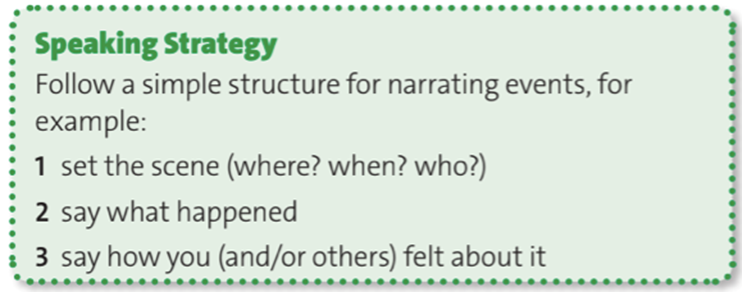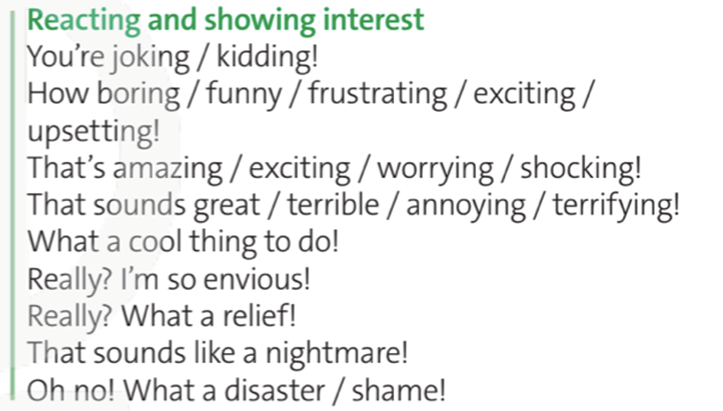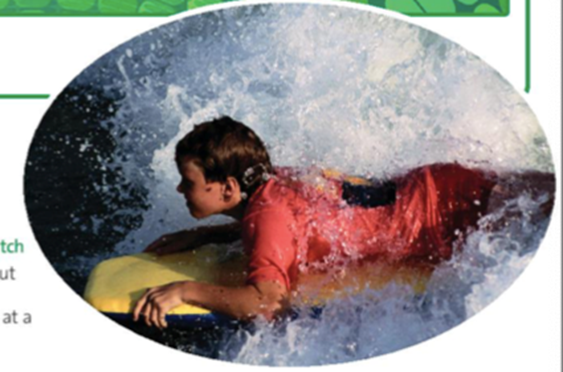Câu hỏi:
05/06/2024 91
Read the Speaking Strategy. Work in pairs. One student tells an event from his / her last summer, the other reacts to the story. (Đọc Chiến lược Nói. Làm việc theo cặp. Một học sinh kể về một sự kiện trong mùa hè năm ngoái của mình, học sinh kia phản ứng với câu chuyện)

Read the Speaking Strategy. Work in pairs. One student tells an event from his / her last summer, the other reacts to the story. (Đọc Chiến lược Nói. Làm việc theo cặp. Một học sinh kể về một sự kiện trong mùa hè năm ngoái của mình, học sinh kia phản ứng với câu chuyện)

Trả lời:
 Giải bởi Vietjack
Giải bởi Vietjack
Hướng dẫn dịch:
Tuân theo một cấu trúc đơn giản để tường thuật các sự kiện, ví dụ:
1. thiết lập bối cảnh (ở đâu? Khi nào? Ai?)
2. nói chuyện gì đã xảy ra
3. nói bạn (và / hoặc những người khác) cảm thấy như thế nào.
Gợi ý:
A: Last summer, I learnt to play the piano.
B: That’s amazing.
A: Last summer, I went to Dubai with my family.
B: Really? I’m so envious.
Hướng dẫn dịch:
A: Mùa hè năm ngoái, tôi học chơi đàn piano.
B: Tuyệt quá.
A: Mùa hè năm ngoái, tôi đi Dubai với gia đình.
B: Thật sao. Ghen tị quá.
Hướng dẫn dịch:
Tuân theo một cấu trúc đơn giản để tường thuật các sự kiện, ví dụ:
1. thiết lập bối cảnh (ở đâu? Khi nào? Ai?)
2. nói chuyện gì đã xảy ra
3. nói bạn (và / hoặc những người khác) cảm thấy như thế nào.
Gợi ý:
A: Last summer, I learnt to play the piano.
B: That’s amazing.
A: Last summer, I went to Dubai with my family.
B: Really? I’m so envious.
Hướng dẫn dịch:
A: Mùa hè năm ngoái, tôi học chơi đàn piano.
B: Tuyệt quá.
A: Mùa hè năm ngoái, tôi đi Dubai với gia đình.
B: Thật sao. Ghen tị quá.
CÂU HỎI HOT CÙNG CHỦ ĐỀ
Câu 1:
Listen to three girls talking about their summer holidays. Match each speaker (1-3) with an event (a-c) and then circle the correct adjective to describe how she felt about it. (Nghe ba cô gái kể về kỳ nghỉ hè của họ. Nối mỗi người (1-3) với một sự kiện (a-c) rồi khoanh tròn tính từ đúng để mô tả cảm nhận của cô ấy về điều đó.)
a. Speaker ___ got sunburned. (Người nói ___ bị cháy nắng)
She felt depressed / embarrassed / worried. (Cô ấy cảm thấy chán nản / xấu hổ / lo lắng)
b. Speaker ___ ran a half marathon. (Người nói___ đã chạy đường dài)
She felt exhausted / proud / surprised. (Cô ấy cảm thấy kiệt sức / tự hào / ngạc nhiên)
c. Speaker ___ visited her friend's new house. (Người nói___ đã đến thăm ngôi nhà mới của bạn cô ấy)
She felt envious / interested / shocked. (Cô ấy cảm thấy ghen tị / thích thú / sốc)
Listen to three girls talking about their summer holidays. Match each speaker (1-3) with an event (a-c) and then circle the correct adjective to describe how she felt about it. (Nghe ba cô gái kể về kỳ nghỉ hè của họ. Nối mỗi người (1-3) với một sự kiện (a-c) rồi khoanh tròn tính từ đúng để mô tả cảm nhận của cô ấy về điều đó.)
a. Speaker ___ got sunburned. (Người nói ___ bị cháy nắng)
She felt depressed / embarrassed / worried. (Cô ấy cảm thấy chán nản / xấu hổ / lo lắng)
b. Speaker ___ ran a half marathon. (Người nói___ đã chạy đường dài)
She felt exhausted / proud / surprised. (Cô ấy cảm thấy kiệt sức / tự hào / ngạc nhiên)
c. Speaker ___ visited her friend's new house. (Người nói___ đã đến thăm ngôi nhà mới của bạn cô ấy)
She felt envious / interested / shocked. (Cô ấy cảm thấy ghen tị / thích thú / sốc)
Câu 2:
Work in pairs. Take turns to say a sentence from the list below using the correct past simple form of the verbs in brackets. Your partner reacts with a suitable phrase from exercise 5. (Làm việc theo cặp. Lần lượt nói một câu dưới đây bằng cách sử dạng đúng của động từ trong ngoặc ở thì quá khứ đơn. của bạn phản ứng bằng một cụm từ phù hợp từ bài tập 5.)
1. I finally (finish) my science project.
2. I (learn) to play a new song on the guitar.
3. I (break) a bone in my foot.
4. I (drop) my dad's laptop.
Work in pairs. Take turns to say a sentence from the list below using the correct past simple form of the verbs in brackets. Your partner reacts with a suitable phrase from exercise 5. (Làm việc theo cặp. Lần lượt nói một câu dưới đây bằng cách sử dạng đúng của động từ trong ngoặc ở thì quá khứ đơn. của bạn phản ứng bằng một cụm từ phù hợp từ bài tập 5.)
1. I finally (finish) my science project.
2. I (learn) to play a new song on the guitar.
3. I (break) a bone in my foot.
4. I (drop) my dad's laptop.
Câu 3:
Complete the dialogue with the correct affirmative or negative past simple form of the verbs below. (Hoàn thành đoạn hội thoại với các động từ ở thì quá khứ đơn thể khẳng định hoặc phủ định)
be
get (lấy)
learn (học)
leave (rời đi)
love (yêu thích)
spend (dành)
watch (xem)
Kirstie: Hi, Laurie. How are you? Tell me about your summer holiday!
Laurie: Well, for the first three weeks, I was at a summer camp in Cornwall.
Kirstie: Really? That sounds like fun!
Laurie: Yes, it was. I _______ a new sport - bodyboarding.
Kirstie: Wow! That sounds great!
Laurie: Yes, I _______ it. It was really exciting and a bit frightening tool
Kirstie: I bet! What else did you get up to over the summer?
Laurie: Well, the second half of the holiday _______ so good. I _______ stomach bug and _______ nearly a week on the sofa.
Kirstie: Oh dear! How awful!
Laurie: I _______ the house for days. I just _______ DVDs. I was so bored!
Complete the dialogue with the correct affirmative or negative past simple form of the verbs below. (Hoàn thành đoạn hội thoại với các động từ ở thì quá khứ đơn thể khẳng định hoặc phủ định)
|
be |
get (lấy) |
|
learn (học) |
leave (rời đi) |
|
love (yêu thích) |
spend (dành) |
|
watch (xem) |
|
Kirstie: Hi, Laurie. How are you? Tell me about your summer holiday!
Laurie: Well, for the first three weeks, I was at a summer camp in Cornwall.
Kirstie: Really? That sounds like fun!
Laurie: Yes, it was. I _______ a new sport - bodyboarding.
Kirstie: Wow! That sounds great!
Laurie: Yes, I _______ it. It was really exciting and a bit frightening tool
Kirstie: I bet! What else did you get up to over the summer?
Laurie: Well, the second half of the holiday _______ so good. I _______ stomach bug and _______ nearly a week on the sofa.
Kirstie: Oh dear! How awful!
Laurie: I _______ the house for days. I just _______ DVDs. I was so bored!
Câu 4:
Listen and check your answers to exercise 2. Does the photo go with the first or second half of the dialogue? How do you know? (Lắng nghe và kiểm tra câu trả lời của bạn ở bài tập 2. Bức ảnh phù hợp với nửa đầu hay nửa sau của đoạn hội thoại? Làm sao em biết?)
Listen and check your answers to exercise 2. Does the photo go with the first or second half of the dialogue? How do you know? (Lắng nghe và kiểm tra câu trả lời của bạn ở bài tập 2. Bức ảnh phù hợp với nửa đầu hay nửa sau của đoạn hội thoại? Làm sao em biết?)
Câu 5:
Pronunciation. Listen to the dialogue in exercise 2 again, then practise saying the phrases above. Try to sound interested! (Phát âm. Nghe lại đoạn hội thoại trong bài tập 2, sau đó luyện nói các cụm từ trên. Cố gắng đọc thật hay nhé!)

Pronunciation. Listen to the dialogue in exercise 2 again, then practise saying the phrases above. Try to sound interested! (Phát âm. Nghe lại đoạn hội thoại trong bài tập 2, sau đó luyện nói các cụm từ trên. Cố gắng đọc thật hay nhé!)

Câu 6:
Look at the photo. Do you know this sport? How do you think it feels to do it? (Nhìn vào bức hình. Bạn có biết môn thể thao này không? Bạn nghĩ cảm giác như thế nào khi chơi nó)

Look at the photo. Do you know this sport? How do you think it feels to do it? (Nhìn vào bức hình. Bạn có biết môn thể thao này không? Bạn nghĩ cảm giác như thế nào khi chơi nó)

Câu 7:
Key phrases. Read the phrases for reacting and showing interest. Then find three more in the dialogue in exercise 2. (Cụm từ khóa. Đọc các cụm từ thể hiện sự phản ứng và sự yêu thích. Sau đó, tìm ba câu thoại khác trong đoạn hội thoại ở bài tập 2.)
Key phrases. Read the phrases for reacting and showing interest. Then find three more in the dialogue in exercise 2. (Cụm từ khóa. Đọc các cụm từ thể hiện sự phản ứng và sự yêu thích. Sau đó, tìm ba câu thoại khác trong đoạn hội thoại ở bài tập 2.)


